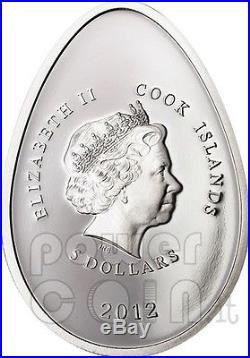IMPERIAL EGGS VIOLET Cloisonne Faberge Silver Coin 5$ Cook Islands 2012

These splendid egg-shaped coins in the Faberge style are decorated with finely Cloisonné technique, a perfect blend of elegance and beauty, the enamel skilfully applied and enriched with Bohemian crystal, the refinement of its decorative properties make it popular among all collectors. This amazing series offers three eggs decorated with Cloisonné technique that are distinguished by color and type of decorations: Red Egg, represents the Rosebud Egg: a Fabergé Imperial egg presented by Emperor Nicholas II to his wife the Empress Alexandra Feodorovna at Easter 1895, enriched by 8 Bohemian Crystals;Violet Egg, lovely collectable egg has been created in the Faberge style. The original designs for the Imperial eggs were inspired by historical art works;Pine Cone Egg: it was made for Alexander Kelch, who presented it to his wife, Barbara (Varvara) Kelch-Bazanova. A Fabergé egg is any one of the thousands of jeweled eggs made by the House of Fabergé from 1885 through 1917. The majority of these were miniature ones that were popular gifts at Eastertide. They would be worn on a neck chain either singly or in groups. The most famous eggs produced by the House were the larger ones made for Alexander III and Nicholas II of Russia. Of the 50 made, 42 have survived. The story began when Tsar Alexander III decided to give his wife the Empress Maria Fedorovna an Easter Egg in 1885, possibly to celebrate the 20th anniversary of their betrothal. It is believed that the Tsars inspiration for the piece was an egg owned by the Empresss aunt, Princess Wilhelmine Marie of Denmark, which had captivated Marias imagination in her childhood. Known as the Hen Egg, it is crafted from gold. Its opaque white enamelled shell opens to reveal its first surprise, a matte yellow gold yolk. This in turn opens to reveal a multi-coloured gold hen, that also opens. It contains a minute diamond replica of the Imperial Crown from which a small ruby pendant was suspended. Unfortunately, these last two surprises have been lost. Empress Maria was so delighted by this gift that Alexander appointed Fabergé a goldsmith by special appointment to the Imperial Crown. He commissioned another egg the following year. However, after that, Peter Carl Fabergé, who headed the House, was apparently given complete freedom for future Imperial Easter Eggs, as from this date their designs become more elaborate. According to the Fabergé family tradition, not even the Tsar knew what form they would take: the only stipulation was that each one should contain a surprise. Following the death of Alexander III on November 1st 1894, his son presented a Fabergé egg to both his wife, the Empress Alexandra Fedorovna, and to his mother, the Dowager Empress Maria Fedorovna. No eggs were made for 1904 and 1905 because of the Russo-Japanese War. Once an initial design had been approved by Peter Carl Fabergé, the work was carried out by an entire team of craftsmen, among them Michael Perkhin, Henrik Wigström and Erik August Kollin. The Imperial eggs enjoyed great fame, and Fabergé made some other large eggs for just a few select private clients, such as the Duchess of Marlborough, the Nobels, the Rothschilds and the Yusupovs. Among them is a series of seven eggs made for the industrialist Alexander Kelch. CLOISONNÉ TECHNIQUE The term “Cloisonné” comes from French and means “subdivided”, separated by walls. Cloisonné is a unique enamel art technique. Thereby, in a first step, the motive is soldered onto a copper sheet with a silver wire. This wire pattern serves as a separation of each colour. Now the originated compartments are filled with enamel colours and afterwards the form is fired in the oven with 700 to 900°C. The enamel in the little compartments will sink down a bit after firing. That will require a refilling. This process will go on repeatedly until the little compartments are finally filled. Finally the surface of the work piece is polished and the silver web is electrolytically gilded to prevent an eventual oxidation. The item “IMPERIAL EGGS VIOLET Cloisonne Faberge Silver Coin 5$ Cook Islands 2012″ is in sale since Tuesday, May 22, 2012. This item is in the category “Coins & Paper Money\Coins\ World\Australia & Oceania\South Pacific”. The seller is “powercoin_italy” and is located in Roma. This item can be shipped worldwide.
- Circulated/Uncirculated: Uncirculated
- Year: 2012
- Composition: Silver
- Country/Region of Manufacture: Cook Islands